13 (b)
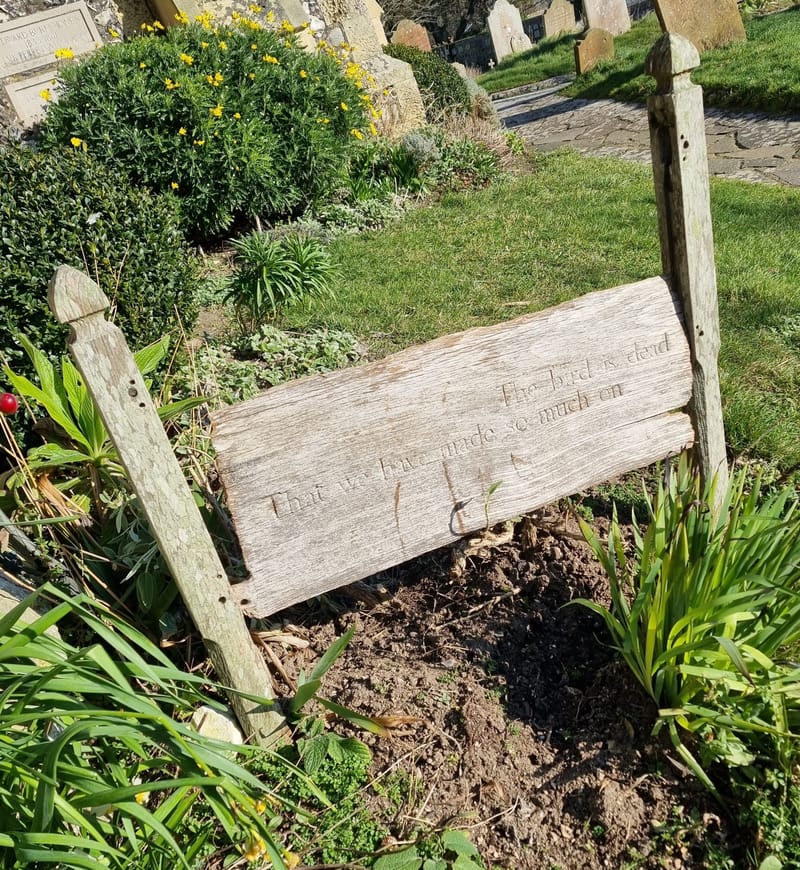
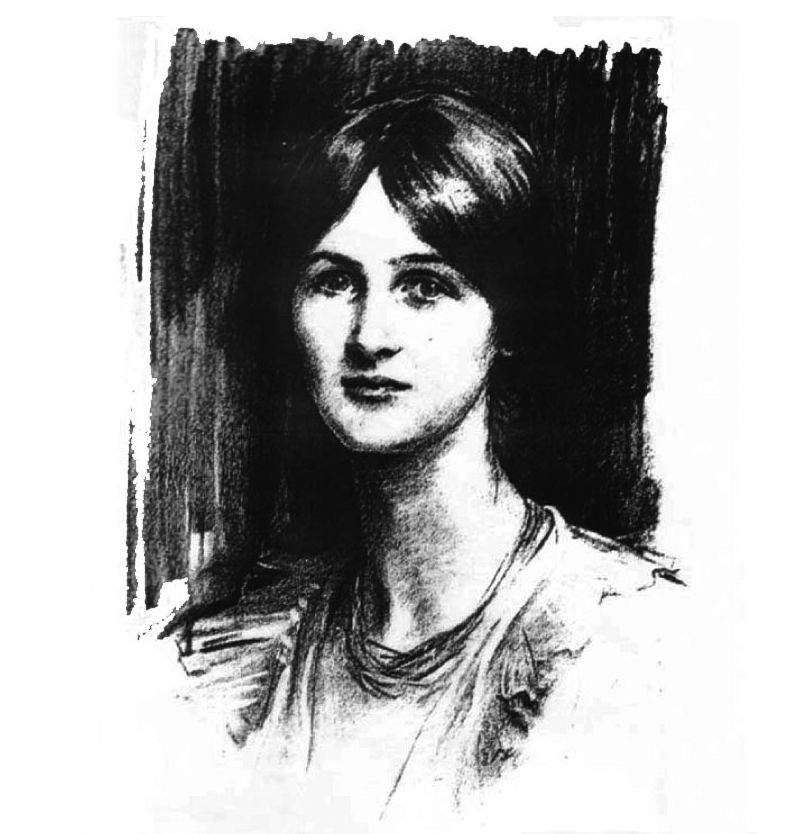 Portrait of Angela Thirkell by John Singer Sargent
Portrait of Angela Thirkell by John Singer Sargent
Author Angela Thirkell [13B] has a special place in the history of Rottingdean in that, not only was she a significant resident of the village, but she also documented some of the history of Rottingdean in her 1931 childhood memoir 'Three Houses' (the third house being North End House [view], Edward and Georgiana Burne-Jones [13A], her grandparent's house).
The wooden leaping board which marks her ashes has, at her request, been left to disappear over time. An earlier photo (below) shows it in a less weathered condition than today. She is buried next to the grave of her third child, daughter Mary Campbel McInnes who was born in 1917 and died within the year. It is in fact her leaping board which still remains in the graveyard, marked 'Mary' on the reverse while the front bears a quote from Shakespeare's 'Cymbeline':
"The bird is dead that we have made such care on".
Thirkell was the daughter of John William Mackail, an Oxford professor of poetry and Margaret Burne-Jones. One of her sons by her first marriage was writer Colin McInnes, author of 'Absolute Beginners'. Through her family connections she was also the first cousin once removed of Rudyard Kipling (who she referred to as 'Cousin Ruddy') and Stanley Baldwin. Her godfather was J M Barrie, author of 'Peter Pan'. She was educated at St. Paul's Girl's School in London and in Paris at a finishing school for young ladies.
Her first marriage in 1911 to singer James Campbell McInnes ended in a blaze of publicity as she divorced him on the grounds of adultery after a 'dalliance' with a servant. McInnes drank heavily during their marriage and was rumoured to have had intimate male relationships prior to it (he named his and Angela's first son Graham after a former lover, Graham Peel). Later in life his bisexuality became widely known.
In 1918 Angela remarried to George Lancelot Allnut Thirkell, a Tasmanian engineer. In 1920 they sailed to Australia with her sons to lead 'a middle class life' in Melbourne - which Angela came to find repugnant. In 1929 she left her husband without warning, returning to England on the pretext of a holiday, but in fact quitting Australia for good.
Thereafter, her "attitude to any man to whom she attracted was summed up in the remark: 'It's very peaceful with no husbands,'" which was quoted by the Observer newspaper in its column 'Sayings of the Week'.
During her prolific writing career Thirkell published a new novel every year, which she referred to in correspondence with her editor as 'new wine in an old bottle'. She professed horror at the idea that her circle of well educated and upper-middle-class friends might read her somewhat low-brow, easy to read fiction: she expected them to prefer, as she did, such writers as Austen, Dickens and Proust.
In the memoir 'Three Houses', Thirkell speaks fondly of her relationship as a child with her beloved grandfather, Burne-Jones:
'Even if I could not remember my grandfather at all, I should have proof enough of his adoring love for me in the photographs that were taken by Mr. Stiles, our Kensington photographer... From among the many photographs of those early years I pick out three. In the first my grandfather is holding me on his knees. I am standing with a fat, rather sulky face turned away from his, which is lightly pressed against mine with a look of deep, patient adoration. In the second he is drawing something for me on a large sheet of cardboard. He is sitting on a wooden studio seat, bowed, with intent eyes, over his work. I, sitting beside him, close up against him, am following the picture with absorbed interest, my hand placed over his to guide the pencil. In the third he is still making a picture for me, but I have lost interest and am impertinently pulling his beard.'
Christmases at North End House with the Burne-Joneses were also the inspiration for her 1940 short story 'Christmas at Mulberry Lodge'.
 Angela Thirkell with her grandfather, Edward Burne-Jones.
Angela Thirkell with her grandfather, Edward Burne-Jones.
Thirkell's novels (there are over 30) went out of fashion during the second half of the 20th century, but have since had something of a revival. Many are now reprinted in paperback by Virago. Her memory is kept alive and honoured today by the Angela Thirkell Society, instigated by her biographer Margot Strickland and supported by her third son Lance Thirkell.
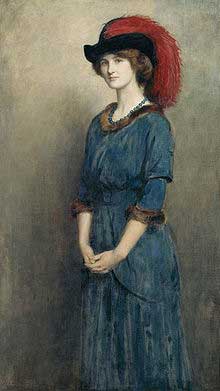
Portrait of Angela McInnes (later Thirkell) hanging in the National Gallery of Victoria, Melbourne, Australia.
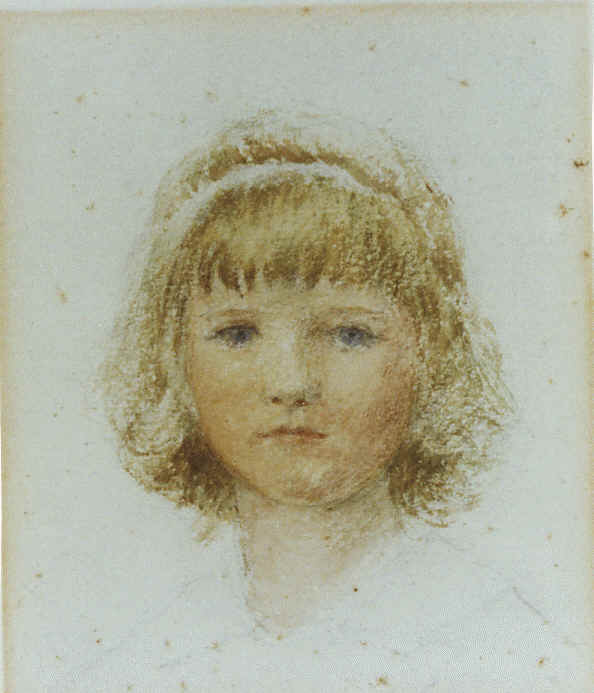 Angela as a child, drawn by Edward Burne-Jones.
Angela as a child, drawn by Edward Burne-Jones.
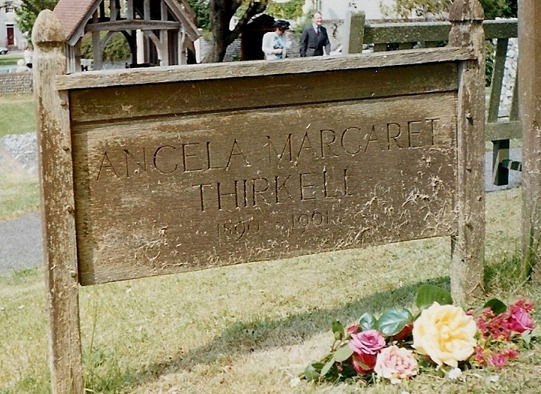 An older, and less weathered, photo of Angela Thirkell's memorial.
An older, and less weathered, photo of Angela Thirkell's memorial.



